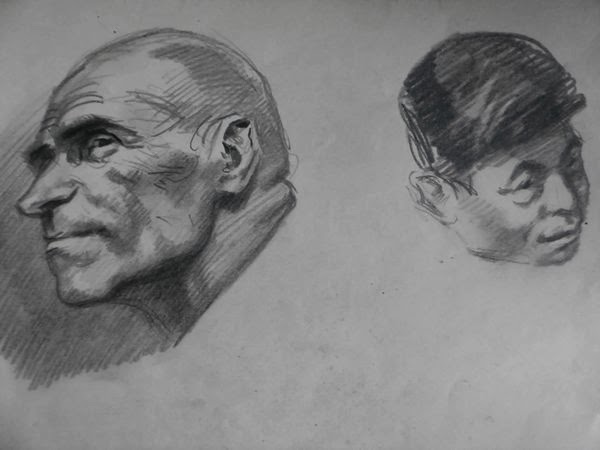 The writings of Simone de Beauvoir (1908-1986) have always given me pleasure – not so much her novels as the various parts of
her autobiography (particularly the travelogues which give such an amazing sense
of immediate post-war Europe in all its dereliction and ideological struggles)
The writings of Simone de Beauvoir (1908-1986) have always given me pleasure – not so much her novels as the various parts of
her autobiography (particularly the travelogues which give such an amazing sense
of immediate post-war Europe in all its dereliction and ideological struggles)
Apart
from her continuing loyalty to Sartre, I knew of her liaisons with Nelson
Algren and Claude Lantzman (the latter still alive) but had not heard of her letters
from 1947-64 to Algren - Beloved Chicago Man (published only in the 1990s). Algren was a tough realist writer in Chicago she had gone to meet
while on a USA tour in 1947 with Sartre who at that moment was dallying with an actress in New York.
I picked up an original hardback version last
week in Sofia’s second-hand English bookshop and was pretty quickly hooked on
its almost 600 pages.
It
is a quite stunning collection of letters (but one-sided) which compares in its
powerful portrayal of love only (in my humble opinion) with Oriana Fallaci’s A Man (see also here). And they're written in her English - which, although quite excellent, contain delightful French constructs from time to time which only deepen the delight. Beloved Chicago Man -
is a revelation. Simone de Beauvoir’s letters to Nelson Algren are, from beginning to end, among the most beautiful sustained pieces of writing that I have read. They begin with the long, frequent, ecstatic communications of 1947 to 1951, chronicle the terrible coming apart and then the lasting attachment of the Fifties, and wind down with the occasional warm messages of the early Sixties. Her (famous) novel The Mandarins - published in 1954 - deals clumsily with the emotions so stunningly expressed in the letters.
This is a 2006 article on the relationship which, in its own cinematic American way, gives a terrific sense of what was actually going
on. de Beauvoir was in what became the famous open relationship with Sartre (who was a lecherous little dwarf) and found herself "de trop" for the moment in New York - and therefore in the mood for some distraction in Chicago. She had not, however, bargained for falling in love - but still cut her visit short when Sartre indicated he needed her in Paris. When, however, she got back to France, it was to discover that the actress was with Sartre. She immediately sent a wire to Algren offering to return to him! It was only some years later that Algren found out all about this - and was not a happy man!
If they hadn’t been such profound writers, capturing so brilliantly the truth of their lives and times, the names of Nelson Algren and Simone de Beauvoir would already be buried like their love. Like the loves of so many Indians and intellectuals, pickpockets and philosophers who danced along the shore of the secondhand sea (a reference to the beach where Algren had a summer shack). And the story we like to tell—the hustler’s heart hustled by the very best, a woman who said she couldn’t, wouldn’t, tell a lie—would be long drowned in the sand.
Partly, Beauvoir and Algren were victims of the myth in which they collaborated. By not talking, by not pointing out her lies, Algren remained a gentleman for a long time. His books, which told the truth as far as he could see, remain rooted in their time. Hers describe parts of the life of a “modern” woman, the parts that backed up Sartre’s ideas about freedom and responsibility, about morality without a God. Algren had to understand that she was “flying blind,” that the only net beneath her trapeze act was being held up by Sartre, that her stories were part of the future and his were part of the past.
So who had the last laugh in our Dunes love story? Simone de Beauvoir is buried next to Sartre in Montparnasse Cemetery in Paris, wearing Nelson Algren’s ring, connected forever to the smartest men she knew.
Nelson Algren would most likely laugh at the irony of millions of people buying her books, stacking them like tourist memorabilia on their shelves, finding almost all of them impossible to read (I don't agree with this judgement!!). Sartre would have thought of all the people he knew existentially—they had no reason for being but themselves. It was up to every individual to do what he or she perceived needed to be done. They all did the best they could.
If, for even a tiny moment, any one of them believed in God, it would be hard not to see a Divine Sense of Humor at work. When sand slides into a house, it seeks no comfort or revenge, has no contempt or jealousy, satisfaction or guilt. The Dunes bury everything: beach houses, roads, forests, Hepburn, Mitchum, Tracy, dolls and books, everything.To get a sense of how well de Beauvoir could write, read this extended excerpt from her notes on her travels around the USA called - America Day by Day







